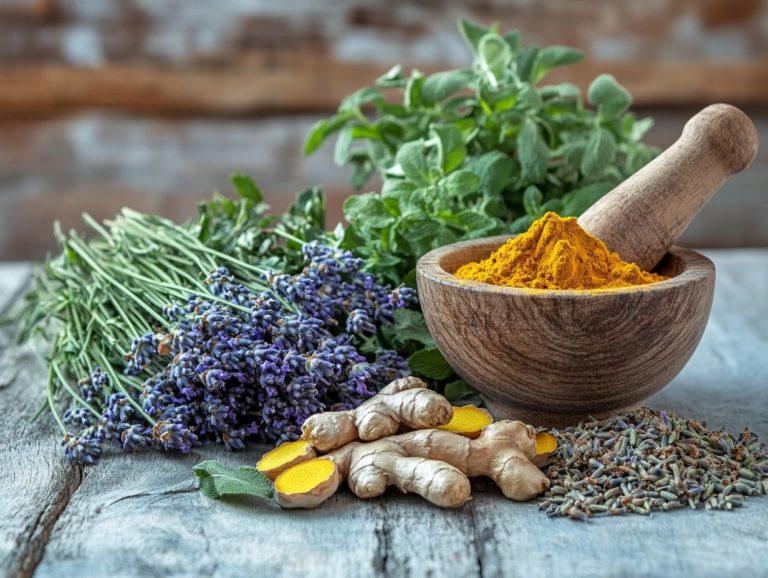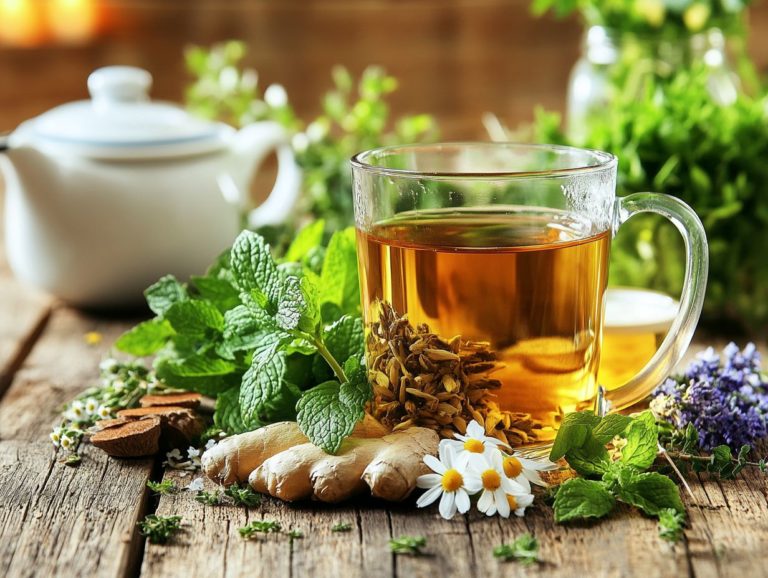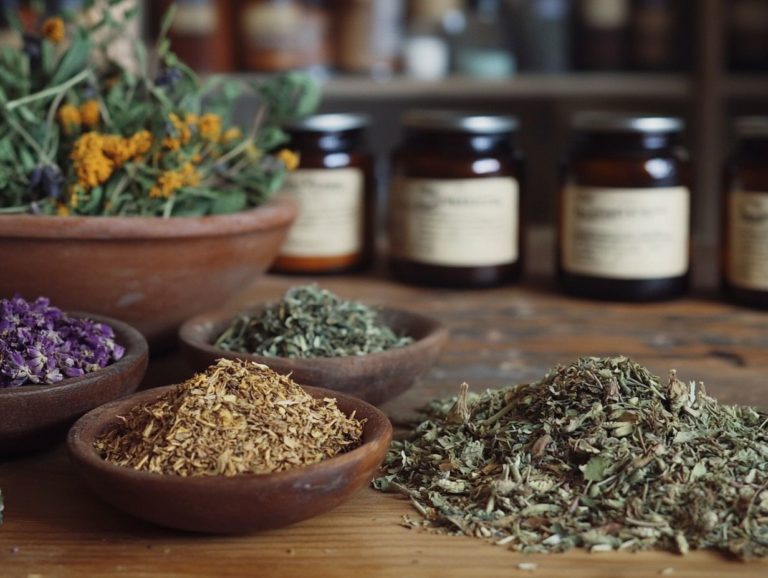What Should I Include in Herbal Remedy Research?
Herbal remedies, often referred to as herbal medicine, have become popular as a natural avenue for health and wellness. However, understanding their benefits and risks is essential.
This article delves into the significance of researching herbal remedies. It emphasizes their efficacy and safety, along with the necessary precautions when choosing these products. You ll find insights into various types of studies, from experimental to observational research. Key factors like the quality of information, consumer safety, and your personal health history will also be considered.
Resources for conducting well-informed research on herbal products and their active ingredients are readily available. Equip yourself to navigate the exciting world of herbal remedies with confidence!
Contents
- Key Takeaways:
- Benefits of Researching Herbal Remedies
- Types of Research for Herbal Remedies
- Factors to Consider in Herbal Remedy Research
- Resources for Conducting Herbal Remedy Research
- Frequently Asked Questions
- What Should I Include in Herbal Remedy Research?
- 1. What are the most common uses of the herb?
- 2. What are the active ingredients and properties of the herb?
- 3. What are the potential side effects and risks of the herb?
- 4. Are there any recommended dosages or preparations of the herb?
- 5. What does the current scientific research say about the herb?
- 6. Are there any contraindications for using the herb?
Key Takeaways:

- Researching herbal remedies can help you understand their effectiveness and safety, ensuring you make informed decisions about your health.
- There are different types of research for herbal remedies, including experimental studies, observational studies, and reviews that summarize the results from several studies.
- When conducting research, it’s important to consider the source and quality of information, along with your personal health and medical history especially concerning potential side effects and herbal interactions.
What are Herbal Remedies?
Herbal remedies are natural treatments sourced from medicinal plants. They have been embraced by various cultures for centuries and are often known as herbal medicine. Traditional medicine provides foundational knowledge about these remedies, which include everything from herbal extracts and teas to capsules and herbal supplements. These are designed to enhance health and wellness.
While these remedies are steeped in tradition, modern science is beginning to pay more attention to their efficacy and safety. Many individuals turn to alternative therapies like herbal therapy for their health concerns.
Remember, “natural does not mean safe.” Some herbal treatments can cause side effects or interact negatively with other medications.
Historically, herbal medicine has roots in ancient civilizations like China, Egypt, and India. Practitioners in these cultures harnessed plant-based solutions to address a wide range of ailments. Each culture has unique beliefs about the healing properties of specific herbs, often weaving spirituality and holistic health into their practices and emphasizing the mind-body connection.
Common forms of these remedies include tinctures, poultices, and infusions, each crafted for specific therapeutic purposes.
Interest in complementary and alternative medicine is growing rapidly. It s important to understand the effectiveness and safety of herbal products. Being aware of consumer safety, potential allergies, and possible interactions with prescription medications is essential for ensuring responsible use of these natural treatments.
Benefits of Researching Herbal Remedies
Researching herbal remedies and herbal supplements is essential if you’re looking to truly understand their efficacy and safety. This knowledge enables you to make informed choices about your health.
In an era where evidence-based medicine is gaining traction, it s crucial to delve into the scientific support behind popular herbal treatments like St. John’s Wort, Kava, and Echinacea, especially regarding clinical practice.
These remedies are frequently perceived as safer alternatives to conventional pharmaceuticals. However, understanding their actual effectiveness and the precautions when choosing them is key to making the best decisions for your well-being.
Understanding Effectiveness and Safety
Understanding the effectiveness and safety of herbal remedies is crucial for consumers. This knowledge helps you distinguish between scientifically supported claims and misleading marketing tactics that exploit the popularity of herbal products. Many herbal products may be praised for their health benefits, but they can pose risks and potential interactions with medications if not used judiciously and without appropriate medical supervision.
By following established herbal guidelines and quality control standards, you can navigate the complexities of herbal consumption more confidently.
When evaluating the reliability of herbal claims, consider key factors such as:
- Sourcing of ingredients
- Manufacturing processes
- Quality control measures, including certifications
Independent testing and certification confirm that a product meets specific safety and efficacy standards, ensuring consumer safety. FDA regulations are also important in overseeing these processes and maintaining the quality and standardization of herbal products. Be attentive to labels and seek certifications that affirm adherence to strict quality norms.
Remember, herbal remedies can interact with your medications, so learn how to read herbal medicine research to protect your health! Prioritizing your health over marketing hype is essential, especially in the context of herbal consumer advice.
Types of Research for Herbal Remedies
You will encounter various research methodologies in exploring herbal remedies, including reviews and meta-analyses studies that combine results from multiple experiments. This research spans from experimental studies that carefully measure the effects of active ingredients and herbal preparations in controlled environments to observational studies that examine real-world usage patterns and outcomes among consumers.
Each approach enriches our understanding of how these remedies function in practice.
Experimental Studies

Experimental studies are essential for evaluating the effectiveness of herbal remedies through controlled clinical trials that carefully measure the effects of specific botanical products on health outcomes and herbal safety. These studies provide robust evidence about active ingredients, their potential benefits, and any possible side effects or interactions.
By employing rigorous methodologies, these studies reveal how herbal treatments can seamlessly integrate into conventional medicine, enhancing the mind-body connection. For example, notable clinical trials on ginseng have shown its potential to enhance cognitive function and reduce fatigue, illustrating its role in modern science. Similarly, research on garlic has demonstrated its effectiveness in managing blood pressure and cholesterol levels, reinforcing its status as an important herbal therapy. Additionally, understanding what to include in a herbal remedy first aid kit can further enhance your approach to natural health.
Understanding the safety profiles of these herbs and their dosages is paramount, allowing practitioners to recommend them confidently. The insights gained from these experimental studies refine clinical practice and enable you to make informed choices about your health and the potential benefits of herbal therapies, including how to create your own herbal remedy.
Observational Studies
Observational studies are crucial for evaluating herbal remedies. They provide real-world data, showing how these products are used outside clinical settings and the cultural beliefs that influence their consumption.
Researchers observe diverse populations to uncover insights into herbal product applications. This helps you understand their effectiveness and any common safety issues or interactions.
User experiences in these studies reveal potential side effects that controlled trials might miss. This emphasizes the need for consumer safety.
Such findings guide both you and healthcare professionals in making informed decisions about integrating herbal remedies into treatments.
Reviews and Meta-Analyses
Reviews and meta-analyses provide a thorough assessment of research on herbal remedies. They synthesize results from multiple studies, offering a clearer view of efficacy and safety.
By evaluating collective evidence, these analyses help you understand the benefits and risks of various herbal treatments.
Factors to Consider in Herbal Remedy Research
When exploring herbal remedies, several factors demand your attention. Consider the sources of information, potential herb interactions, and your personal health history.
Assess the credibility of the sources you consult to ensure your choices are safe and well-informed, particularly regarding herbal consumer advice.
Source and Quality of Information
The source and quality of information are vital when researching herbal remedies. Reliable sources enhance your understanding and keep you safe.
Misinformation can lead to unsafe consumption and diminish the benefits of these natural products. Differentiate between reputable and dubious sources.
Websites like ConsumerLab.com and the National Institutes of Health (NIH) exemplify trustworthy platforms that offer evidence-based insights into herbal supplements, enabling you to make informed choices.
By prioritizing reliable information, you ll reap the benefits of herbal remedies while steering clear of dangerous misinformation.
Personal Health and Medical History

Personal health and medical history are crucial elements to consider when evaluating herbal remedies. Your individual health conditions can significantly influence the efficacy and safety of these treatments.
Understanding how your unique health profile interacts with herbal products is vital for ensuring your safety. You may have varying levels of sensitivity to specific herbs or might encounter interactions with prescribed medications that could lead to possible side effects.
Therefore, it s highly advisable to engage in discussions with doctors and other health experts before embarking on any herbal regimen. Such consultations can shed light on potential herbal interactions with your existing treatments and help outline necessary safety protocols.
By prioritizing these conversations, you can skillfully navigate the intricate landscape of herbal options while safeguarding your overall health and well-being.
Resources for Conducting Herbal Remedy Research
It’s essential to use credible resources when conducting thorough research on herbal remedies. These resources guide you through the complexities of herbal information and prioritize your safety as a consumer.
Reliable sources can encompass academic journals, reputable websites, and consultations with healthcare professionals, who offer valuable expert guidance. Engaging with such resources enhances your understanding and enables you to make informed decisions.
Reliable Sources and Databases
Reliable sources and databases are crucial for obtaining accurate information on herbal remedies, ensuring access to evidence-based medicine. Resources like Elsevier, the University of Washington, and government health sites provide credible insights into the efficacy and safety of various herbal products.
These reputable platforms also provide databases such as PubMed and Cochrane Library, which offer peer-reviewed articles and systematic reviews that consolidate the latest research findings. By utilizing these evidence-based resources, you can effectively distinguish beneficial herbs from those that may be ineffective or even harmful. Additionally, understanding how to document effects of herbal remedies can enable you to make informed choices.
Referencing scholarly literature and trustworthy health organizations allows you to better understand the complex interactions between herbal remedies and conventional treatments. For more insight, consider exploring best practices for herbal remedy use. This ultimately promotes a more holistic approach to your health.
Consulting with Healthcare Professionals
Consulting with healthcare professionals is an essential step in safely using herbal remedies. They can offer personalized advice tailored to your health condition and medication regimen. This professional guidance not only makes you aware of possible side effects and interactions but also helps you identify effective herbal preparations that suit your needs.
Engaging with these experts fosters a deeper understanding of how specific herbs might interact with your prescribed medications or existing health issues, ultimately promoting safer consumption. By discussing your complete health history, healthcare providers can make more precise recommendations, ensuring that you are opting for safe choices that align with your overall wellness goals. Additionally, being aware of common mistakes to avoid with herbal remedies can further enhance your safety and effectiveness in using these natural treatments.
With their expertise, these professionals can spot any situation where herbs and medications should not be used together and adjust your herbal plans accordingly, enhancing your safety even further. Therefore, seeking medical supervision is a vital step for anyone looking to integrate herbal remedies into their health regimen.
Frequently Asked Questions
What Should I Include in Herbal Remedy Research?

Herbal remedy research is an important step in incorporating natural remedies into your health routine. To ensure a thorough and accurate research process, here are some key things you should include:
1. What are the most common uses of the herb?
It’s important to understand the primary uses of the herb you are researching. This will give you an idea of its potential benefits and how it may be able to help with your specific health concerns.
2. What are the active ingredients and properties of the herb?
Understanding the active compounds and properties of the herb can help you grasp how it functions in the body.
It also informs you about possible interactions with other medications or herbs.
3. What are the potential side effects and risks of the herb?
Be aware of potential side effects and risks when using the herb.
This knowledge helps you make informed health decisions.
4. Are there any recommended dosages or preparations of the herb?
Some herbs work better in specific forms or dosages.
Research recommended dosages and preparations for safe and effective use of the herb.
5. What does the current scientific research say about the herb?
Reviewing current scientific research on the herb is essential.
This can help you understand its effectiveness and identify any conflicting studies or controversies.
6. Are there any contraindications for using the herb?
Not all herbs are suitable for everyone.
Consult your healthcare provider to ensure the herb is safe for you, especially if you have medical conditions or take medications.






